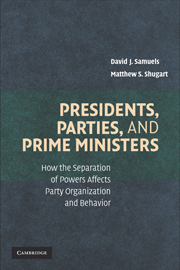 Presidents, Parties, and Prime Ministers
Presidents, Parties, and Prime Ministers Book contents
- Frontmatter
- Contents
- Preface and Acknowledgments
- Presidents, Parties, and Prime Ministers
- 1 Introduction
- 2 Political Parties in the Neo-Madisonian Theoretical Framework
- 3 Insiders and Outsiders
- 4 Constitutional Design and Intraparty Leadership Accountability
- 5 Electoral Separation of Purpose within Political Parties
- 6 The Impact of Constitutional Change on Party Organization and Behavior
- 7 Parties' “Presidential Dilemmas” in Brazil and Mexico
- 8 Presidents, Prime Ministers, and Mandate Representation
- 9 Conclusion
- References
- Index
6 - The Impact of Constitutional Change on Party Organization and Behavior
Published online by Cambridge University Press: 05 June 2012
- Frontmatter
- Contents
- Preface and Acknowledgments
- Presidents, Parties, and Prime Ministers
- 1 Introduction
- 2 Political Parties in the Neo-Madisonian Theoretical Framework
- 3 Insiders and Outsiders
- 4 Constitutional Design and Intraparty Leadership Accountability
- 5 Electoral Separation of Purpose within Political Parties
- 6 The Impact of Constitutional Change on Party Organization and Behavior
- 7 Parties' “Presidential Dilemmas” in Brazil and Mexico
- 8 Presidents, Prime Ministers, and Mandate Representation
- 9 Conclusion
- References
- Index
Summary
As we argued in Chapter 2, all parties face collective action problems – and all parties confront the dilemmas raised by delegating power and resources to a single leader who will stand as the party's candidate for national office. The question we seek to answer is precisely how differences in the relationship between voters and the executive and legislative branches of government shape parties' ability to address these challenges.
Under parliamentarism's fusion of executive and legislative authority, parties organize to win legislative seats, and retain maximum accountability over their prime-ministerial agents. Yet under the separation of origin and/or survival, parties face different organizational and behavioral incentives. As shown in Chapters 3 and 4, when voters have two agents – the legislative party and a president – parties face more complex intraparty delegation and accountability problems. Moreover, when winning the executive branch directly – rather than winning legislative seats – becomes parties' driving goal, parties must favor “vote-seeking” incentives in election campaigns. Chapter 5 provided evidence that parties' executive and legislative vote bases can diverge quite widely in separation of powers systems. In short, parties that concentrate on winning executive elections will develop different organizational forms, nominate different sorts of leaders, and adopt different electoral strategies than they would under parliamentarism.
To test the hypothesis that parties organize and behave differently under different democratic constitutional regimes, we would ideally compare parties in countries that shifted from purely fused powers to purely separated, or vice versa.
- Type
- Chapter
- Information
- Presidents, Parties, and Prime MinistersHow the Separation of Powers Affects Party Organization and Behavior, pp. 162 - 192Publisher: Cambridge University PressPrint publication year: 2010


